#favorite poetry
Photo

Eliza Griswold
2K notes
·
View notes
Quote
We look at the world once, in childhood. The rest is memory.
Louise Gluck
#louise gluck#poetry#favorite poetry#poem#poems#quotes#quote#dark academia#light academia#romantic academia#aesthetic#allie's stupid blog#in my louise gluck era#poet
34 notes
·
View notes
Text
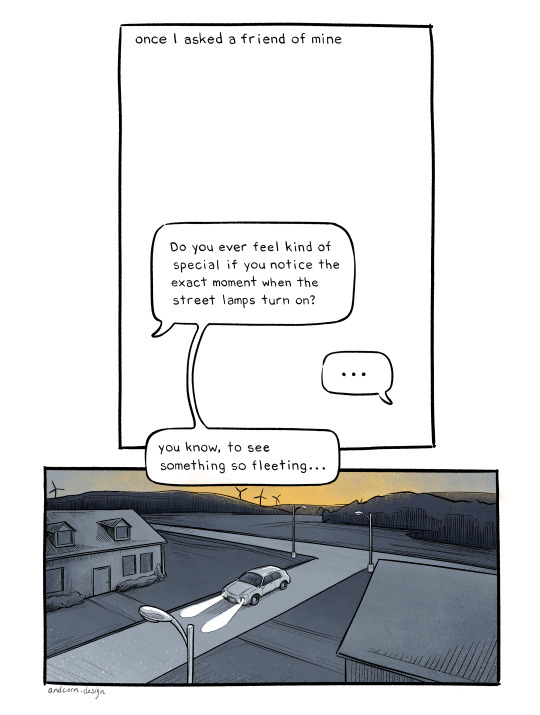

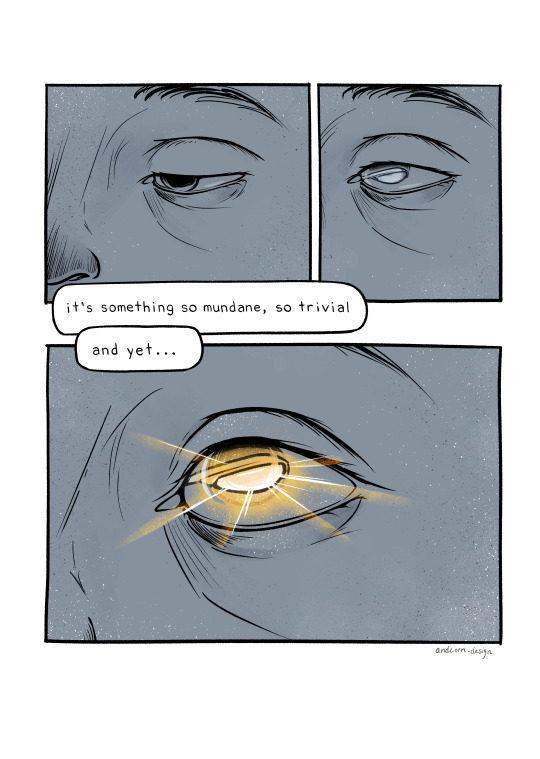
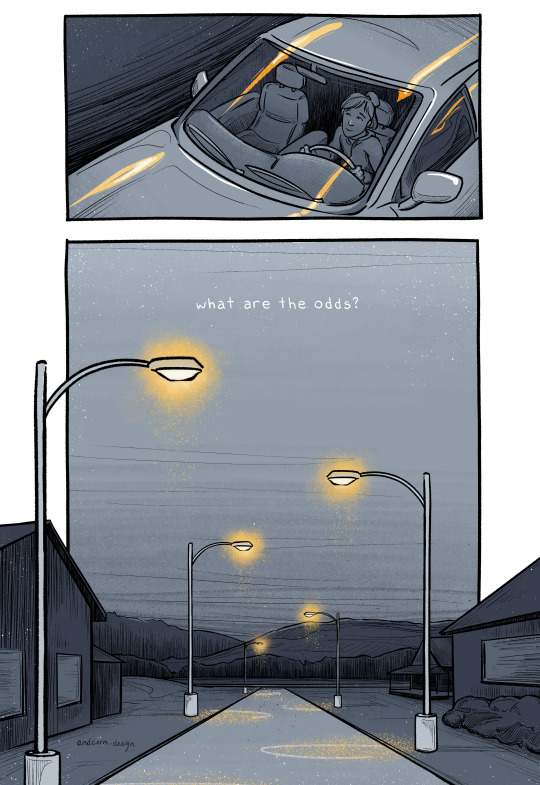
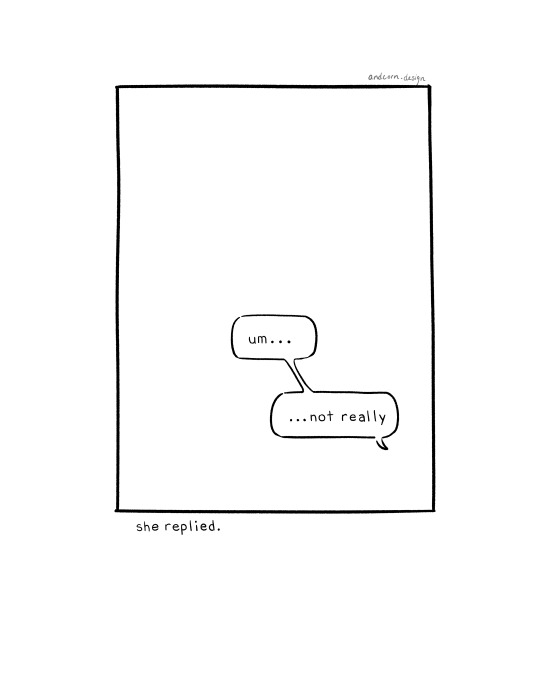
#this was the first comic that i made in this style and i think it's still my favorite#comic#comic art#original comic#web comic#webcomic#illustration#illustrated story#relatable#thoughtful#thoughtful comic#thoughtful writing#writing#original story#original poetry#prose poetry#short poem#illustrated prose#original art#illustrative art#storytelling#relatable story#relatable writing#ramblings#random thoughts#comic artist#illustration artist#amateur poet#poetry art#artists of tumblr
9K notes
·
View notes
Text
"Tell me every terrible thing you ever did, and let me love you anyway."
Edgar Allan Poe
#poetry#edgar allan poe#this one is my favorite#words words words#poems#poems on tumblr#poetic#prose#dark academia#falling in love#poem#poems and poetry#edgar allan poe quotes#literally words
3K notes
·
View notes
Text
louise glück was an tremendous poet in her own life and also taught, advised, and nurtured uncountable other poets. her picking richard siken’s crush for the yale younger poets prize is a well known fact, but she selected a number of other poets for publication during her tenure as the contest judge that i think are worth knowing.
peter streckfus, cuckoo (2003)
richard siken, crush (2004)
jay hopler, green squall (2005)
jessica fisher, frail-craft (2006)
fady joudah, the earth in the attic (2007)
arda collins, it is daylight (2008)
ken chen, juvenilia (2009)
katherine larson, radial symmetry (2010)
poetry is a community! read her—and also read the poets she wanted to promote.
#sitting in bed with my yale anthology#reading lists are everywhere if you know where to look#katherine larson is a personal favorite of mine#fady joudah might be of particular interest; his parents are palestinian refugees#poetry#poetry recs#louise glück#mine
6K notes
·
View notes
Text
thinking about what zuko means to azula and weeping. he's a traitor but he's your brother. he held you when you were born. he's banished for being too weak to hurt your father and you learn to hate his goodness. he is somewhere in the world carrying your eyes. he misses your absent mother more than he loves you but that is the price you pay for being the one who stayed. he never grants you this same kindness. you are faster and deadlier and better but it doesn't change the fact that your brave big brother used to tell you stories of dragons every time it stormed because you were so afraid of the thunder. he is the only one who understands what it means to bear the brunt of your bloody inheritance. he crumbled under the weight of it, but you stayed. you always stay. he is half of you. you hate being betrayed.
you don't love him. he's your big brother. who could you possibly love more?
#my favorite most tortured sibling dynamic in the world#zuko and azula#zuko#azula#atla#avatar: the last airbender#fire nation#fire siblings#ozai#iroh#atla meta#poetry#atla comics
3K notes
·
View notes
Text
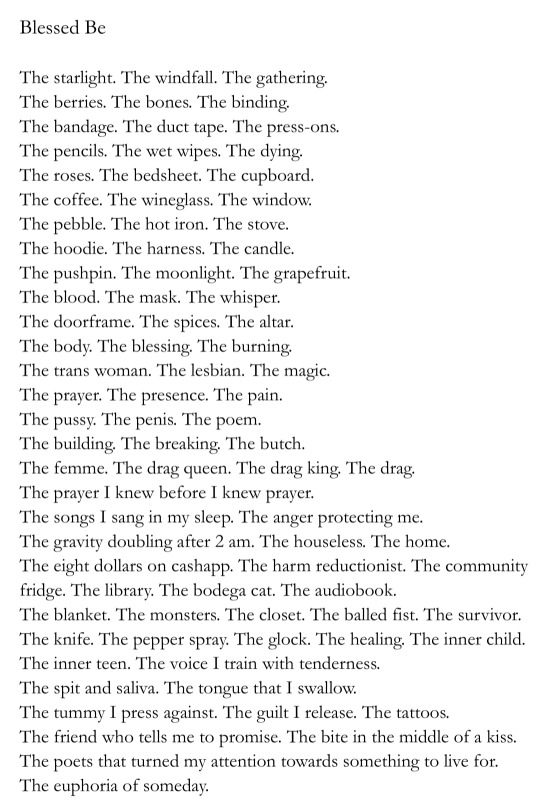
Blessed Be by Sol Rios, published in Ghost of my Ghosts
#was immensely honored to write the foreword for gomg!! probably my favorite poem from the entire collection#sol rios#ghost of my ghosts#currently reading#queer poetry#trans poetry#silas denver melvin#contemporary poetry#modern poetry
4K notes
·
View notes
Text


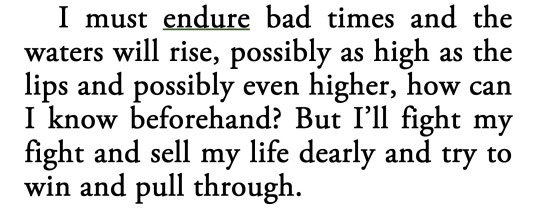







"to endure!"
vincent van gogh ("trees and undergrowth")
robert lowell [How will the heart endure?]
vincent van gogh [I must endure bad times and the waters will rise, possibly as high as the lips and possibly even higher, how can I know beforehand? But I’ll fight my fight and sell my life dearly and try to win and pull through.]
rainer maria rilke [To be loved means to be consumed. To love means to radiate with inexhaustible light. To be loved is to pass away, to love is to endure.]
joan didion [Not just to endure it, not just to suffer it, not just to pass through it, but to live in it.]
elena ferrante [maybe not even a very orderly mind can endure the discovery of not being loved.]
elena ferrante [I will give what I can give, I will take what I can take, I will endure what has to be endured.]
han kang [The feeling that she had never really lived in this world caught her by surprise. It was a fact. She had never lived. Even as a child, as far back as she could remember, she had done nothing but endure.]
victor frankl [What is to give light must endure burning.]
#quotes#literature#favorite words in favorite quotes#classic literature#web weavings#parallels#typography#to endure#vincent van gogh#robert lowell#rainer maria rilke#poetry#joan didion#elena ferrante#han kang#victor frankl#translated literature
5K notes
·
View notes
Text
It's world poetry day so here are some (more) of my favorite poems:
What You Missed That Day You Were Absent from Fourth Grade by Brad Aaron Modlin
All Trains Are Going Local by Timothy Liu
Rural Boys Watch the Apocalypse by Keaton St. James (@boykeats)
HOPE YOU’RE WELL. PLEASE DON’T READ THIS. by Lev St. Valentine (@dogrotpdf)
Time of Love by Claribel Alegría
Every Job Has a First Day by Rebecca Gayle Howell
ALL THAT WANTING, RIGHT? by Devin Kelly
Reading by A.R. Ammons
things i want to ask you by Helga Floros
Night Bird by Danusha Laméris
Prayer for Werewolves by Stephanie Burt
The Two Times I Loved You the Most In a Car by Dorothea Grossman
The Yearner by Rachel Long
If I Had Three Lives by Sarah Russell
I Dream on a Crowded Subway Train with My Eyes Open But My Body Swaying by Chen Chen
We Have Not Long to Love by Tennessee Williams
Jesus at the Gay Bar by Jay Hulme
Cracks by Dieu Dinh
and here's part one <3
#already working on next year's list <3#these are a few of my favorite things#brad aaron modlin#timothy liu#keaton st. james#lev st. valentine#claribel alegría#rebecca gayle howell#devin kelly#a.r. ammons#helga floros#danusha laméris#stephanie burt#dorothea grossman#rachel long#sarah russell#chen chen#tennessee williams#jay hulme#dieu dinh#world poetry day#poetry#literature#poetry recs#not to me not if it's queue
2K notes
·
View notes
Quote
Why love what you will lose?
There is nothing else to love.
Louise Gluck, Triumph of Achilles
#louise gluck#favorite poetry#favorite poets#poet#poetry#poem#quotes#quote#dark academia#romantic academia#light academia#aesthetic#allie's stupid blog#romantic
4 notes
·
View notes
Text

This sums up the Barbieheimer experience better than anything else ngl
#barbieheimer#dj crazy times#planet of the bass#Barbie#oppenheimer#music#obssesed with the lyrics women are my favorite guy… like…. that’s poetry
4K notes
·
View notes
Text


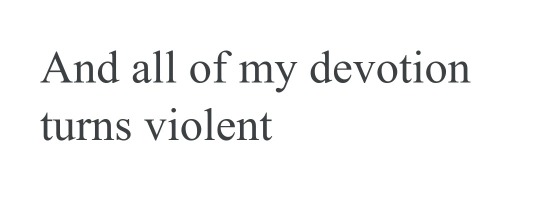

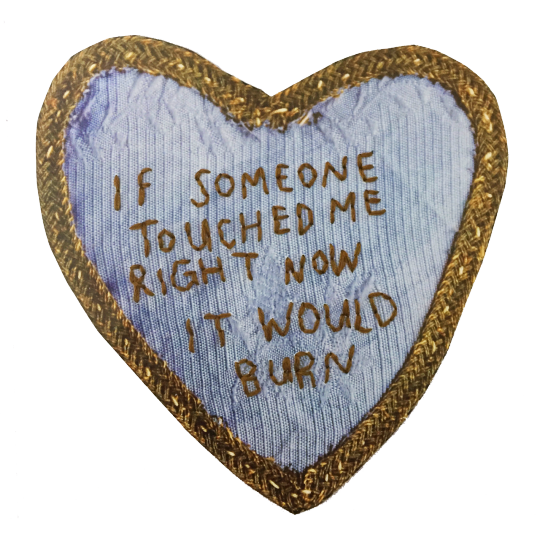


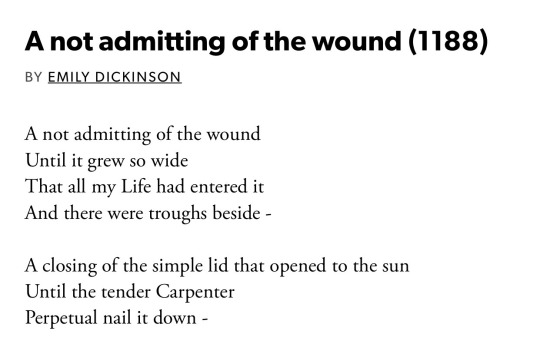

and I'm sorry I left, but it was for the best my little dove...
absolute solitude: selected poems, dulce maria loynaz (tr. james o'connor) // the glass essay, anne carson // boyish, japanese breakfast // @uglyfruit // yves olade // hunger, harry styles // a not admitting of the wound, emily dickinson // no surprises, radiohead // fourth of july, sufjan stevens
#fun fact#fourth of july is one of his favorite songs#god i cant#web weaving#parallels#poetry#dulce maria loynaz#the glass essay#anne carson#breakup#i guess#litany in which certain things are crossed out#richard siken#uglyfruit#anger#harry styles#emily dickinson#radiohead#sufjan stevens#500+#1000+#2000+#3000+#4000+#5000+#6000+#7000+
11K notes
·
View notes
Text
"The language of flowers and silent things."
– Charles Baudelaire, from Elevation; Fleurs Du Mal (tr. by William Aggeler), 1857
#these are my favorite things#dark academia#light academia#dark acadamia aesthetic#excerpts#fragments#poetry#romanticism#books & libraries#booklover#booklr#book quotes#literature quotes#lit#spilled love#spilled ink#spilled thoughts#spilled words#spilled poem#english literature#on love#on life#dark academism#light academism#soft academia#original poem#writings on tumblr#poets and writers#writings#writerscorner
8K notes
·
View notes
Text
We Who Are Your Closest Friends
by Phillip Lopate
we who are
your closest friends
feel the time
has come to tell you
that every Thursday
we have been meeting
as a group
to devise ways
to keep you
in perpetual uncertainty
frustration
discontent and
torture
by neither loving you
as much as you want
nor cutting you adrift
your analyst is
in on it
plus your boyfriend
and your ex-husband
and we have pledged
to disappoint you
as long as you need us
in announcing our
association
we realize we have
placed in your hands
a possible antidote
against uncertainty
indeed against ourselves
but since our Thursday nights
have brought us
to a community of purpose
rare in itself
with you as
the natural center
we feel hopeful you
will continue to make
unreasonable
demands for affection
if not as a consequence
of your
disastrous personality
then for the good of the collective
645 notes
·
View notes
Text
None Of You Know What Haiku Are
I'm going to preface this by saying that i am not an expert in ANY form of poetry, just an enthusiast. Also, this post is... really long. Too long? Definitely too long. Whoops! I love poetry.
If you ask most English-speaking people (or haiku-bot) what a haiku is, they would probably say that it's a form of poetry that has 3 lines, with 5, and then 7, and then 5 syllables in them. That's certainly what I was taught in school when we did our scant poetry unit, but since... idk elementary school when I learned that, I've learned that that's actually a pretty inaccurate definition of haiku. And I think that inaccurate definition is a big part of why most people (myself included until relatively recently!) think that haiku are kind of... dumb? unimpressive? simple and boring? I mean, if you can just put any words with the right number of syllables into 3 lines, what makes it special?
Well, let me get into why the 5-7-5 understanding of haiku is wrong, and also what makes haiku so special (with examples)!
First of all, Japanese doesn't have syllables! There's a few different names for what phonetic units actually make up the language- In Japanese, they're called "On" (音), which translates to "sound", although English-language linguists often call it a "mora" (μ), which (quoting from Wikipedia here) "is a basic timing unit in the phonology of some spoken languages, equal to or shorter than a syllable." (x) "Oh" is one syllable, and also one mora, whereas "Oi" has one syllable, but two moras. "Ba" has one mora, "Baa" has two moras, etc. In English, we would say that a haiku is made up of three lines, with 5-7-5 syllables in them, 17 syllables total. In Japanese, that would be 17 sounds.
For an example of the difference, the word "haiku", in English, has 2 syllables (hai-ku), but in Japanese, はいく has 3 sounds (ha-i-ku). "Christmas" has 2 syllables, but in Japanese, "クリスマス" (ku-ri-su-ma-su) is 5 sounds! that's a while line on its own! Sometimes the syllables are the same as the sounds ("sushi" is two syllables, and すし is two sounds), but sometimes they're very different.
In addition, words in Japanese are frequently longer than their English equivalents. For example, the word "cuckoo" in Japanese is "ほととぎす" (hototogisu).
Now, I'm sure you're all very impressed at how I can use an English to Japanese dictionary (thank you, my mother is proud), but what does any of this matter? So two languages are different. How does that impact our understanding of haiku?
Well, if you think about the fact that Japanese words are frequently longer than English words, AND that Japanese counts sounds and not syllables, you can see how, "based purely on a 17-syllable counting method, a poet writing in English could easily slip in enough words for two haiku in Japanese” (quote from Grit, Grace, and Gold: Haiku Celebrating the Sports of Summer by Kit Pancoast Nagamura). If you're writing a poem using 17 English syllables, you are writing significantly more content than is in an authentic Japanese haiku.
(Also not all Japanese haiku are 17 sounds at all. It's really more of a guideline.)
Focusing on the 5-7-5 form leads to ignoring other strategies/common conventions of haiku, which personally, I think are more interesting! Two of the big ones are kigo, a season word, and kireji, a cutting word.
Kigo are words/phrases/images associated with a particular season, like snow for winter, or cherry blossoms for spring. In Japan, they actually publish reference books of kigo called saijiki, which is basically like a dictionary or almanac of kigo, describing the meaning, providing a list of related words, and some haiku that use that kigo. Using a a particular kigo both grounds the haiku in a particular time, but also alludes to other haiku that have used the same one.
Kireji is a thing that doesn't easily translate to English, but it's almost like a spoken piece of punctuation, separating the haiku into two parts/images that resonate with and add depth to each other. Some examples of kireji would be "ya", "keri", and "kana." Here's kireji in action in one of the most famous haiku:
古池や 蛙飛び込む 水の音
(Furu ike ya kawazu tobikomu mizu no oto)
(The old pond —
A frog jumps in
The sound of the water.)
You can see the kireji at the end of the first line- 古池や literally translates to "old pond ya". The "ya" doesn't have linguistic meaning, but it denotes the separation between the two focuses of the haiku. First, we are picturing a pond. It's old, mature. The water is still. And then there's a frog! It's spring and he's fresh and new to the world! He jumps into the pond and goes "splash"! Wowie! When I say "cutting word", instead of say, a knife cutting, I like to imagine a film cut. The camera shows the pond, and then it cuts to the frog who jumps in.
English doesn't really have a version of this, at least not one that's spoken, but in English language haiku, people will frequently use a dash or an ellipses to fill the same role.
Format aside, there are also some conventions of the actual content, too. They frequently focus on nature, and are generally use direct language without metaphor. They use concrete images without judgement or analysis, inviting the reader to step into their shoes and imagine how they'd feel in the situation. It's not about describing how you feel, so much as it's about describing what made you feel.
Now, let's put it all together, looking at a haiku written Yosa Buson around 1760 (translated by Harold G. Henderson)
The piercing chill I feel:
my dead wife's comb, in our bedroom,
under my heel
We've got our kigo with "the piercing chill." We read that, and we imagine it's probably winter. It's cold, and the kind of cold wind that cuts through you. There's our kireji- this translation uses a colon to differentiate our two images: the piercing chill, and the poet stepping on his dead wife's comb. There's no descriptions of what the poet is feeling, but you can imagine stepping into his shoes. You can imagine the pain he's experiencing in that moment on your own.
"But tumblr user corvidcall!" I hear you say, "All the examples you've used so far are Japanese haiku that have been translated! Are you implying that it's impossible for a good haiku to be written in English?" NO!!!!! I love English haiku! Here's a good example, which won first place in the 2000 Henderson haiku contest, sponsored by the Haiku Society of America:
meteor shower . . .
a gentle wave
wets our sandals
When you read this one, can you imagine being in the poet's place? Do you feel the surprise as the tide comes in? Do you feel the summer-ness of the moment? Haiku are about describing things with the senses, and how you take in the world around you. In a way, it's like the poet is only setting a scene, which you inhabit and fill with meaning based on your own experiences. You and I are imagining different beaches, different waves, different people that make up the "our" it mentioned.
"Do I HAVE to include all these things when I write haiku? If I include all these things, does that mean my haiku will be good?" I mean, I don't know. What colors make up a good painting? What scenes make up a good play? It's a creative medium, and nobody can really tell you you can't experiment with form. Certainly not me! But I think it's important to know what the conventions of the form are, so you can appreciate good examples of it, and so you can know what you're actually experimenting with. And I mean... I'm not the poetry cops. But if you're not interested in engaging with the actual conventions and limitations of the form, then why are you even using that form?
I'll leave you with one more English language haiku, which is probably my favorite haiku ever. It was written by Tom Bierovic, and won first place at the 2021 Haiku Society of America Haiku Awards
a year at most . . .
we pretend to watch
the hummingbirds
Sources: (x) (x) (x) (x) (x) (x)
Further reading:
Forms in English Haiku by Keiko Imaoka
Haiku: A Whole Lot More Than 5-7-5 by Jack
How to Write a Bad Haiku by KrisL
Haiku Are Not a Joke: A Plea from a Poet Who Has Had It Up to Here by Sandra Simpson
Haiku Checklist by Katherine Raine
#poetry#haiku#writing#literature#anime life#long post#i want to apologize but i had to get something off my chest#and the thing was. i love haiku#and when i see posts on here about haiku. i get so angy.#well ok i really get more disappointed bc nobody is really engaging with the form on its own terms#anyway i hope you enjoy some of my favorite haiku because theyre in there!!!!!#i didnt really get into the history of haiku. and i also did not get into why i got really into it#but i will say that i was really inspired by Jacob Geller's video A Thousand Ways of Seeing a Forest#which is a lot about translation#(which i mean. as an interpreter AND a poetry-enjoyer. really appealed to me lol)
10K notes
·
View notes
Text
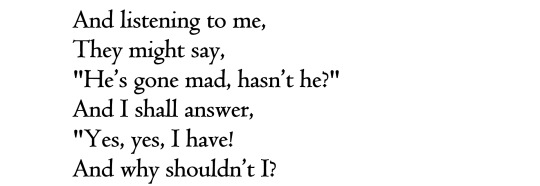




Paruyr Sevak, "To Go Mad" (translated by metamorphesque)
#one of my absolute favorites#quotes#literature#poetry#my translations#classic literature#poems#armenian literature#paruyr sevak#translated literature#madness
2K notes
·
View notes